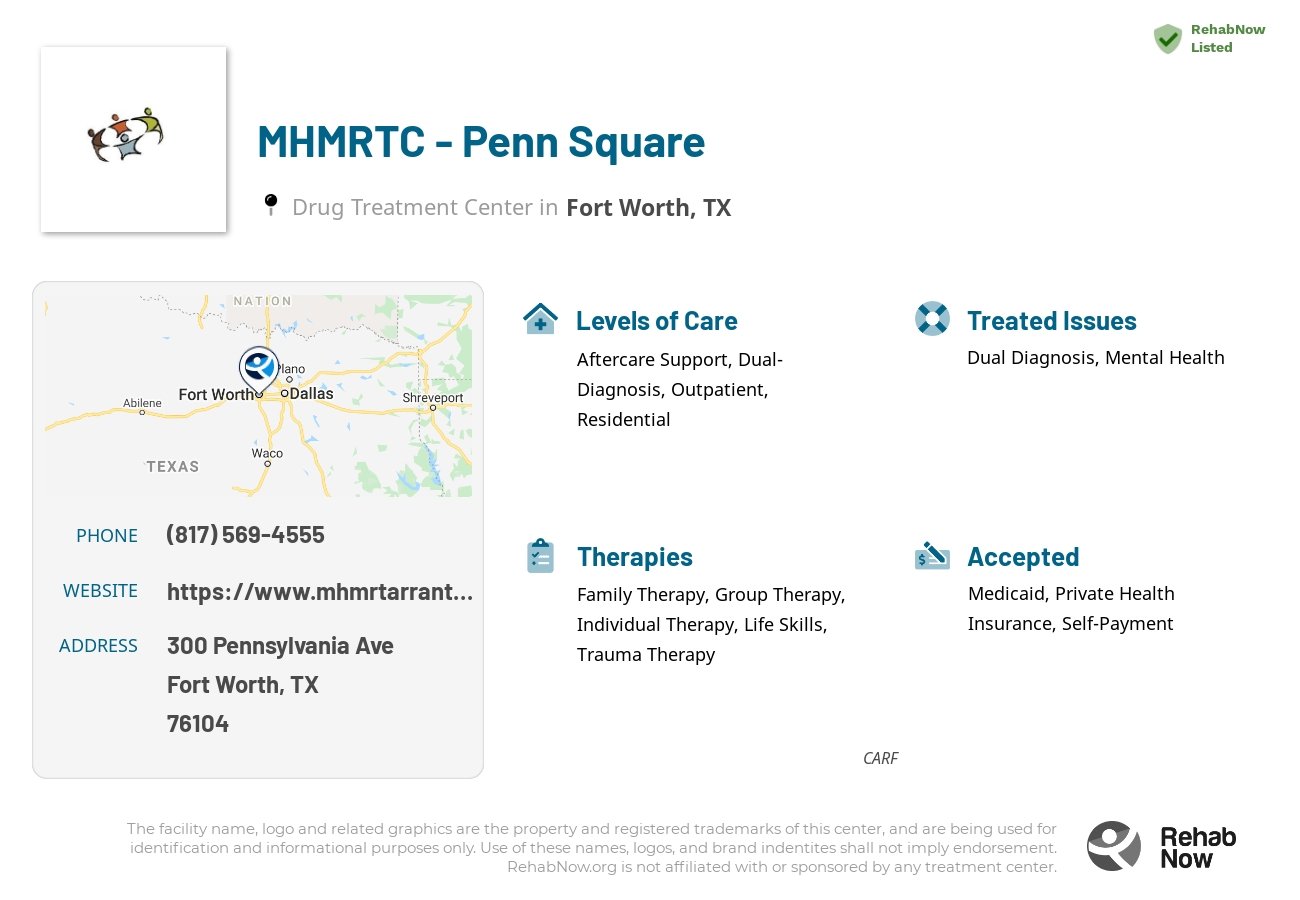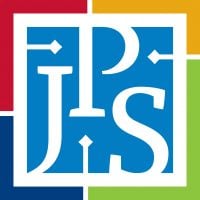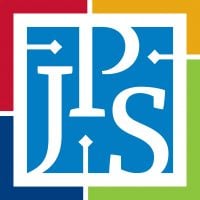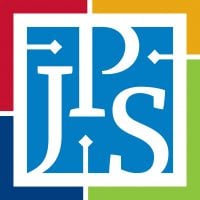MHMRTC - Penn Square
Drug Rehab Center in Fort Worth, Texas
Penn Square is an accredited and state licensed addiction treatment facility in Fort Worth, Texas that offers a variety of services for people with drug addiction, substance abuse, alcoholism, dual diagnosis, and mental health issues, such as outpatient, residential, detox levels of care, and aftercare support, and accepts private health insurance.
About This Fort Worth, TX Facility
Located in Fort Worth, Texas, MHMRTC - Penn Square is an adult outpatient clinic that primarily focuses on mental health support for community members. This facility stands out for its innovative and personal approach to treating substance use disorders and mental health conditions, offering a supportive environment for recovery.
MHMRTC - Penn Square is distinguished by its CARF accreditation and state licensure, attesting to its high standards in addiction treatment. Additionally, the facility offers comprehensive services including dual diagnosis, mental health support, aftercare, and flexible levels of care, ensuring each individual's needs are met.
- State-Licensed and CARF Accredited: Ensuring the highest standards of care and professionalism in addiction recovery.
- Comprehensive Treatment Options: From evidence-based counseling to life skills training and holistic therapies, catering to the individual needs of each client.
- Flexible Levels of Care: Including detox, residential, and outpatient services, tailored to support varying degrees of addiction.
MHMRTC - Penn Square addresses a range of addictions and mental health issues, utilizing a blend of treatment methods and care levels. The facility offers a holistic approach to recovery, incorporating evidence-based therapies and personalized treatment plans to foster long-term sobriety and mental health wellness.
Genders
Ages
Modality
Additional
Accreditations
State License

CARF
The Commission on Accreditation of Rehabilitation Facilities (CARF) is a non-profit organization that specifically accredits rehab organizations. Founded in 1966, CARF's, mission is to help service providers like rehab facilities maintain high standards of care.
Conditions and Issues Treated
Recovering from any type of substance abuse is a long process, but it is one of the most worthwhile and life changing events any addicted person will ever go through. This is a combination of detoxing the body, rehabilitation, and recovery. There is also therapy, aftercare, and support during the entire process.
While substance abuse can take over a person’s life, it is something that can also be overcame by professionals at MHMRTC - Penn Square in Fort Worth, TX
Addiction is often caused by an underlying issue. Mental illnesses like schizophrenia, bipolar disorder or anxiety disorder could lie at the root. A dual diagnosis by MHMRTC - Penn Square aims to treat the addiction as well as the cause of the addiction. This ensures the patient will not fall back on old ways after treatment is complete.
Levels of Care Offered
This center offers a variety of custom treatment tailored to individual recovery. Currently available are Aftercare Support, Detox, Dual-Diagnosis, Outpatient, Residential, with additional therapies available as listed below.
Detox is a drug rehab process that begins before the actual drug rehab treatment. It is used to remove any residual toxins left in your body (and brain) after using drugs, and it is used with the intent to help you or your loved one complete drug rehab.
If you are addicted to opiates like heroin, methadone, or prescription painkillers, you will detox with medication. This is because the withdrawal symptoms are often more intense and uncomfortable for an opiate addict than for someone who has abused or is dependent on other drugs, like cocaine.
Detox alone will not make you stop using drugs; it is a process that allows you or your loved one to get ready for the next step of rehab.
Outpatient treatment can be considered the lowest intensity level of addiction treatment in Fort Worth, TX. It is ideal for early phase addiction or lower intensity addictions. MHMRTC - Penn Square peer group support, 12-step programs, and individual counseling may still be involved.
Residential treatment programs are those that offer housing and meals in addition to substance abuse treatment. Rehab facilities that offer residential treatment allow patients to focus solely on recovery, in an environment totally separate from their lives. Some rehab centers specialize in short-term residential treatment (a few days to a week or two), while others solely provide treatment on a long-term basis (several weeks to months). Some offer both, and tailor treatment to the patient’s individual requirements.
Aftercare support plays an important role when sustaining a patient’s full recovery at MHMRTC - Penn Square. Patients also receive assistance in making living arrangements in halfway houses. Career counseling is available for those who want a fresh start. There are also local community programs in Fort Worth, TX such as Alcoholics Anonymous.
MHMRTC - Penn Square‘s Therapies & Programs
Individual professional counseling or individual therapy refers to the one-on-one interaction between a patient and his or her counselor. Individual therapy allows for more privacy, one that group interactions can’t provide. Therefore, it becomes easier for a person to unload and become more open to his or her counselor.
Another benefit of individual therapy at MHMRTC - Penn Square in Fort Worth, TX is that all sessions aim to speed up a single person’s progress. It makes it easier for the counselor and the patient to deal with the central issues, which are likely the culprits of substance addiction.
Once the roots of the problems are addressed, it becomes less challenging for a recovering patient to maintain sobriety and brush off temptations.
Families are not always as supportive as they could be, but by opting for family therapy, many recovering addicts are able to understand their addiction and get the support they need to get sober. These therapy sessions at MHMRTC - Penn Square in Fort Worth, TX involve all members of the family who play a role in the recovering person’s daily life. They work together to overcome past issues, avoid triggers, and remain strong and supportive of each other.
In group therapy, the patient undergoes sessions with other patients dealing with similar problems under the guidance of a trained counselor. The members of the group interact with each other and talk freely about their issues. The recovery of members of the group from the problems that they face gives the patients confidence that they can also overcome their addiction.
Group therapy at MHMRTC - Penn Square reduces the feeling of loneliness and improves the coping skills of the patients. Group therapy provides patients with continuous feedback from other members. The group dynamics ensure that members start having some structure and routine in their lives.
The 12 step program is the treatment method used by Alcoholics Anonymous, but it can apply to any type of addiction. It outlines the 12 steps addicts should take on the path to recovery. Steps include admitting you have a problem and making the decision to turn your life around. A belief in a higher power and making amends to others are also part of the program.
Patient Experience
Creative Arts
In creative art therapy, the therapist encourages the patients to express themselves through activities like sketching, painting, sculpting, coloring, collaging etc. The therapy can be administered at an individual or a group level. Creative art helps the patients to express their emotions consciously or unconsciously.
- Patients are often able to communicate effectively, through creative art, what they cannot verbally.
- The therapy helps patients to handle stress and anxiety in a better manner.
- They become more self-aware and develop higher self-esteem.
- The therapy improves their communication skills and ability to process past traumatic events.
- Creative art helps the patients to improve their physical, mental and emotional well-being.
Experiential Therapy at MHMRTC - Penn Square
Experiential therapy can involve acting, props, arts and crafts, animal care or other tools. It can help revisit and heal from past traumas. Trust between the therapist at MHMRTC - Penn Square and individual is important for success and grown over the stay.
Fitness Therapy
More often than not, treating substance addiction requires different types of therapies carried out simultaneously to cover all the bases and the patient’s needs. One of the most encouraging and exciting treatment methods is fitness therapy. In fitness therapy, patients inject movements into regular counseling sessions at MHMRTC - Penn Square in Fort Worth, Texas. It has physical, mental, and emotional benefits.Not only do individuals become more driven and goal-oriented, but they also experience an increase in strength and flexibility. In some cases, fitness therapy aids in healing various physical ailments on top of hastening the addiction recovery process. Exercising can also help enhance the cognitive functions of the brain and improve attention span. Physical exercise also alleviates the craving for addictive substances as it provides your mind and body with a healthier alternative.
Payment Options Accepted
For specific insurance or payment methods please contact us.
Is your insurance accepted?
Ask an expert, call (888) 674-0062
Additional Details
Specifics, location, and helpful extra information.
Fort Worth, Texas 76104 Phone Number(817) 569-4555 Meta DetailsUpdated April 15, 2024
Staff Verified
Patient Reviews
There are no reviews yet. Be the first one to write one.
Fort Worth, Texas Addiction Information
Texas is one of the primary hubs for drug smuggling into the country. The border between Texas and Mexico is more than 1,000 miles long. More than 10 million residents use alcohol every year and more than 25% of those are minors. Alcohol and drug use has become so common in Texas that almost 15% of all deaths can be attributed to these substances.
Fort Worth has the highest rate of drug overdoses in the state. 1 out of every 8 Fort Worth residents struggles with a substance abuse problem. In 2016, there were nearly 1,000 overdose deaths in the city. Prescription painkillers are often accessible and cheaper than street drugs. Heroin and methamphetamine are also becoming common addictions. Fort Worth has several detox and rehabilitation facilities that help individuals overcome their dependence on drugs and alcohol.
Treatment in Nearby Cities
- Kerrville, TX (214.7 mi.)
- Seguin, TX (222.5 mi.)
- Kaufman, TX (60.3 mi.)
- Joshua, TX (19.5 mi.)
- Athens, TX (93.6 mi.)
Centers near MHMRTC - Penn Square
The facility name, logo and brand are the property and registered trademarks of MHMRTC - Penn Square, and are being used for identification and informational purposes only. Use of these names, logos and brands shall not imply endorsement. RehabNow.org is not affiliated with or sponsored by MHMRTC - Penn Square.













